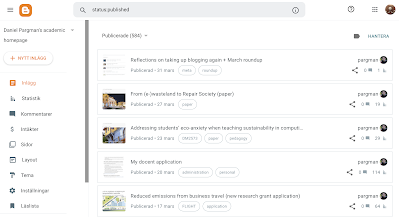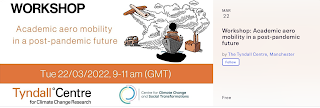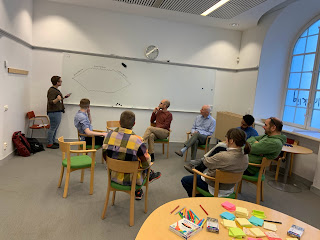.
I started this blog in 2010 and my level of ambition - then as now - has been to:
post (low-volume, aiming for a minimum of one message and a maximum of two messages per week) about my academically-related activities - for the benefit of those who wish to keep up with what I do and also for me to remember what I did last week!
March Roundup
- MID event (March 7)
For the first time in two years the division of Media Technology and Interaction Design (MID) had a get-together in our kitchen with catered food and the kitchen was crowded and people spilled over into neighboring spaces. It was really nice to see so many people together after all the cancelled Summer parties, Christmas dinners and writing camps during the last two years! There was no particular reason for the get-together besides the fact that we were allowed and haven't had a party for (literally) years
.
- Artificial Intelligence and Ecocide Law (March 10)
One of the panelists, Pella, invited me to this event and although it was nice, this event happened in the run-up to possibly my most hectic week ever (March 14-18, see other published blog posts), so my mind was unfortunately not 100% in the seminar. This was unfortunate because what I heard sounded really interesting!
Artificial Intelligence is an exponentially growing field of technology, a powerful force for source control and new pathways. But how do we secure that it is used in a benign way for humans and nature? Could AI be the new plastic? Can Ecocide Law be the ethical framework to govern AI in a benign direction, as a force for sustainable development?
Andre Uhl, Technology and Innovation Fellow, Harvard Planetary Health Alliance; Chair, IEEE Earth Lab.
Pella Thiel, ecologist, expert in the UN Harmony with Nature knowledge network.
Jonas Roupé, Ecocide Law Alliance.
.
- Minna 30% seminar (March 18)
My phd student Minna Laurell Thorslund presented her 30% seminar in mid-March and her presentation was awesome! Her seminar really should have generated a blog post of its' own, but this text will have to do as soo much else was happening that week in particular! Here's the invitation thought:
Title: HCI in service of imagination: Exploring how to support transitions toward sustainable collective practices beyond the individual
Abstract: Environmental challenges are forcing humans to rethink their place in the world. This is no small task, especially when it has been argued that we collectively suffer from a “crisis of imagination”, limiting our collective imaginaries of the future to apocalyptic disasters or dystopian technofutures. The HCI community, with its rich knowledge base and ideological advocacy of human-centred systems and values, is well positioned to facilitate important collective explorations of what it means to live and build a good life in a future of uncertainty, complexity and upheaval. Minna’s research explores how HCI, in its various forms and functions, can support collective transitions toward more sustainable practices and constellations, beyond individuals as consumers.
- ICT4S reading group (March 18)
.
- Workshop: Academic aero mobility in a post-pandemic future (March 22)
The Tyndall Centre for Climate Change Research in Manchester organized a workshop on academic flying. This of course fits neatly with my research project, "Decreased CO2-emissions in flight-intensive organisations", so me and phd student Aksel Biørn-Hansen attended this online seminar together with 50+ other persons.
This workshop aims to spark/leverage changes on the academic structures and systems, helping to build institutional alliances that leverage the requests for changes, transparency and common frameworks to work on implementing air travel policies in academic institutions. It will focus on discussing three main topics:
Group 1: Reducing academic aero mobility: Gains in accessibility, inclusivity and Justice. Ways to deliver broader access, equity and justice in research collaborations, through air-travel reductions.
Group 2: Cultural changes to decouple aero mobility from academic work. Required institutional and social changes to decouple aero mobility from international collaborations and the need for academic united alliances.
Group 3: Effective reporting to reduce academic air travel carbon emissions. Options to achieve transparent and systematic reporting of carbon emissions related to air travel associated with academic institutions;
It is expected that participants [will be] sharing their experiences, hearing and understanding others, and developing potential actions and strategies for a less flight intensive future in Academia.
I joined group 3 and Aksel joined group 2. My group produced a nice board with suggestions for actions, but the tool itself (padlet) was a bit limited and awkward to use (see image below). I could move my own post-it notes but was not allowed to move around other participants' notes, so the only person who could effectively cluster (and change shape etc.) of the notes was the organizer. That also meant we spent too little time actually talking to each other and too much time describing which note should be moved where... I don't know enough to know if this was a problem with the tool or a problem with the setup of the tool. With so many interesting people in the Zoom room, it definitely felt like we could have used the time better, but the workshop was still very good!
One super-great outcome of attending this workshop though was that we decided we (our research project) would organize our own online workshop in September. More on that later...
- MID4S Reboot (March 24)
As with the MID event (above), our team/research group hasn't met physically altogether for a very long time, so we had a half-day "Reboot" that my colleague Elina and phd students Aksel and Arjun organized according to principles from Art of Hosting. There were nine persons at the event and the organization was excellent! We all felt welcome and seen and it created a lot of can-do energy in the group!
Two very concrete outcomes of this workshop was that we will restart our research group blog next month and we will change the name of the group. The name MID4S - Media Technology and Interaction Design for Sustainability - has served us well within the department (MID) for the better part of 10 years, but is not so great when we want to communicate within the School of Electrical Engineering and Computer Science, to say nothing about communicating who we are and what we do outside of our School and outside of KTH. I will write more about the new blog and about the new name later!
.
- Data Workshop (March 29)
We have a guest in our research group, Martin Lindrup, who is a phd student at Aalborg University, Denmark. Martin arrived in the beginning of February and will stay until the summer and he is hosted by my colleague Rob Comber. Martin organized a workshop that I attended about "how to make data more meaningful in the context of sustainability", a topic that is very much in line with his 2021 article "One Byte at a Time: Insights about Meaningful Data for Sustainable Food Consumption Practices".
Referring to Martin's workshop is however just a pretext for presenting Martin (something that should have been done in a February blog post - except I didn't write any blog posts in February). Martin gave a talk at one of our semiweekly research group lunch meeting in the beginning of February and here's how he presented himself and the topic of his research:
Speaker: Martin Lindrup, PhD student at the Computer Science Department (Human-Centred Computing group) at Aalborg University, Denmark.
Title: Insights about meaningful data in environmentally sustainable food consumption
Description: Environmental data have been fundamental in shaping our perception about the state of the world. In the form of e.g. carbon footprints, food miles, organic labels, data (note: using the term data is to emphasize the strangeness and different interpretations that people have toward these concepts) have also been used for informing environmentally (un)sustainable ways of eating. However, these data may not fully capture the experiences that people have with food and sustainability. With this talk, I seek to provide insights about how to make data about food sustainability more meaningful for people from the perspective that data are formed by socio-technical circumstances.
About me: I am a PhD student working within the field of Human-Computer Interaction. My background is a mix between techno-anthropology and IT development and design. The project that I work on revolves around digital technologies, data, and sustainable food consumption. I do mainly qualitative research from a Research through Design approach.
.
- Books I've read (March 31).
For a very long time I wrote blog posts about "Books I've read". That's another task that went out of hand and in the end became too ambitious (and arduous). Not only did I write about the books I had read, but I started to post one or two quotes from book I currently reading on Facebook each day. I then wrote about the books I had recently read and also pasted literally a dozen or more quotes from each book. So then it became too much and I stopped. The last blog post about "books I've read" can be found here, but do note that I at that time was one year behind in writing about the books I had "recently" read, i.e. that blog post was published in April 2018 but treated books that I had read one year earlier (Feb-April 2017)...
I have continued to read books since 2017, and since I read 30-35 books per year on average, that's upwards to 150 books I haven't written about at all on the blog and won't write about - which is the pity. It is however possible to find out what books I read for the better part of a decade by following the last blog post backwards in time (each such blog post is linked backwards). I might start to write about "Books I've read" at some point, but will for now only list the books I have finished reading during the month in question. Since March has been an extremely hectic month work-wise (just read all the blog posts!), I have now and then slacked off a bit and not kept up the schedule that guides my book reading habit, and have thus "only" finished two academic books this month:
- Steffen Lange & Tilman Santarius (2020). Smart Green World?: Making Digitalization Work for Sustainability
- Tim Jackson (2021). Post growth: Life after capitalism.








Inga kommentarer:
Skicka en kommentar